EL CALLAO page 3
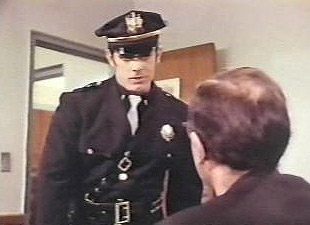
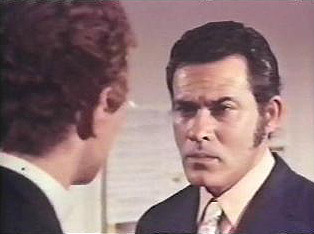
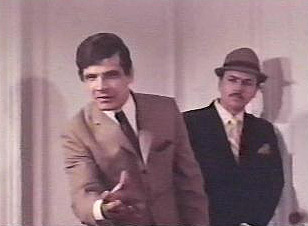
El
Perfumito is released on bail (the implication is that El Callao did it so
he could get revenge on his henchmen for ratting him out). He runs into El Tecato, who claims the
real El Callao is on the loose. El Perfumito and El Tecato start searching the city for the
gangster.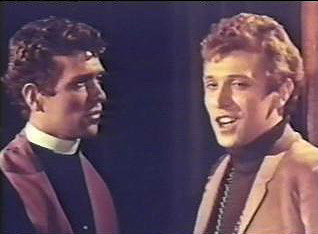 Meanwhile, "Church
Steps In--Priest Walks Out" (this is the most realistic-sounding
newspaper headline in the whole film) and Padre Morán is freed. In church, he hears a man confess to
murder and robbery--outside of the confessional booth, Morán comes face to
face with El Callao, his double. [There is one shot using trick photography showing the two men,
otherwise the scene is accomplished using editing.]
Meanwhile, "Church
Steps In--Priest Walks Out" (this is the most realistic-sounding
newspaper headline in the whole film) and Padre Morán is freed. In church, he hears a man confess to
murder and robbery--outside of the confessional booth, Morán comes face to
face with El Callao, his double. [There is one shot using trick photography showing the two men,
otherwise the scene is accomplished using editing.]
El Callao: "I wanted to see you personally. We're the same person. You're the one who's going to pay for my crimes. If you want, you can denounce me and save your hide. I'm sure you asked God to make the murderer appear, to perform a miracle. Here I am--here's the miracle. Turn me in!" After the killer leaves, Padre Morán prays for help so he won't have to break his vow and reveal a confessional secret. The parish priest arrives and glumly hands Morán an envelope, saying "I had to report what happened to the Holy See. Here's the answer."
Apparently, the Vatican has fired Morán, since he's next seen leaving the church (but still wearing his clerical collar) with his suitcase. In a long montage scored to bluesy music, Morán searches for a place to stay, but is unable to rent an apartment. [He goes to a variety of, I must say, rather shabby-looking places. It's unclear if he's being turned away because of his "reputation" or if there are simply no vacancies.] He finally takes shelter in a darkened courtyard, sitting on some trash and weeping as he says (in voiceover), "Oh God, this is truly a Calvary."
El Tecato tells El Perfumito where El Callao can be found (he got the info from Blanquita's mother), but the mean police detective and his assistant immediately step in (they've been shadowing El Perfumito). El Perfumito begs them to take him along when they arrest his former boss. Meanwhile, the stress is getting to Blanquita, and she tries to walk out on El Callao. He slaps her and demands the reason for her desertion.
Blanquita: "Here's the reason! [she shows him the newspaper headlines reading "Killer at Large"] You killed two men in the robbery and lied to me. You betrayed your friends. El Mudo died because of you. You killed a policeman because you're stupid...you want more? Ciao, baby."
Blanquita leaves, but after a moment El Callao runs to the roof of the hotel (why?) and begs her to return: "Come back, baby! I don't want to do it. Baby, I love you...I need you!" When his (ex) girlfriend refuses to heed his shouts, El Callao shoots her (four times) and leaves her dead in a snowdrift. The detectives and El Perfumito drive up, and while the policemen exchange gunfire with the killer, El Perfumito climbs the stairs to the roof for a final showdown. "That's what I want to see, you son of a bitch," El Callao says. He's out of bullets, so he and El Perfumito fight it out hand-to-hand. The struggle ends with both of them falling off the roof to the sidewalk below. Who should come strolling up but Padre Morán, who closes the eyes of El Callao as his double dies, then makes the sign of the cross. In a strange final shot (which ends the movie in a freeze frame), Padre Morán walks away then looks back and flips a small ball in the air in an imitation of something El Callao had done. This means...what? Certainly not "El Callao switched places with Morán and is now getting away" (there was no chance of that), but is the picture suggesting El Callao's spirit somehow passed into the priest's body? There is no indication of this at all, and in fact the "habit" of tossing the ball in the air and catching it is only seen a couple of times, so it's hardly a significant trait of El Callao. Still, this must mean something, or del Mar wouldn't have made a point of it. Would he?
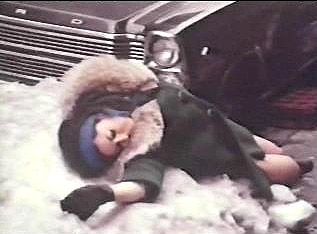
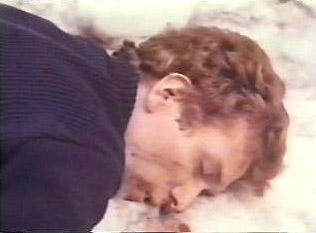
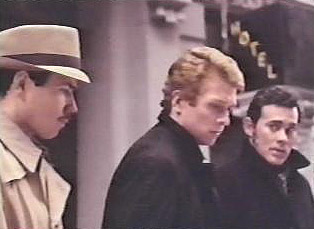
The performances in El Callao are surprisingly good. As noted earlier, José Albar is effective in the dual role of killer and priest--despite their physical resemblance, El Callao and Padre Morán are distinctly different. We don't get much back-story or character development but there are enough hints and brief clues to make both roles interesting. Olga Agostini, who slightly resembles two other actresses from this period, Anne Bancroft and Ina Balin, is fine as Blanquita, while Angelo Ramírez--also in Love After Death--does a good job as El Perfumito. Raúl Rodríguez is amusing as the jumpy junkie El Tecato and Braulio Castillo is professional as the serious police detective.
The production values are really quite satisfactory for a low-budget movie shot entirely on location. The under-scoring is especially appropriate, even if the "theme" music is repeated a little too often. The score doesn't sound like library music, although some of it certainly was (at least one theme was also used in Love After Death). The cold, snow, and rain, along with the evocative New York/New Jersey locations give El Callao a distinctive mise-en-scene, captured professionally by Glen Tracy's photography.
El Callao has a few script problems which, while annoying, do not really hinder one's enjoyment of the film. For example, although it is not specifically stated, it is strongly implied that Padre Morán arrives on 13 January from overseas: thus, he should have an alibi for El Callao's first robbery (i.e., immigration records) and not need the gypsy cabdriver's testimony. Even if he came to New York from Puerto Rico or another U.S. location, the time of his arrival should be a matter of record. As should his identity: the police and El Perfumito imply that Morán is El Callao and just posing as a priest (i.e., not that he is a real priest who is also a criminal), whereas the Vatican should be able to easily prove otherwise. It's also illogical for El Callao and Blanquita to "hide out" in New York (although it's a big city) after they double-cross El Mudo and El Perfumito--do they think they'll never accidentally meet anyone they know?--and to seek refuge in West New York after El Callao kills a local policeman there. Although El Callao says "it's the one place no one would look for us," this seems crazy.
These minor points aside, El Callao is an excellent, independent crime drama which is unfairly overlooked, chiefly due to its relative obscurity and the language barrier.
BACK TO THE
FILMS OF GLAUCO DEL MAR
The Nuyorican Films Page

